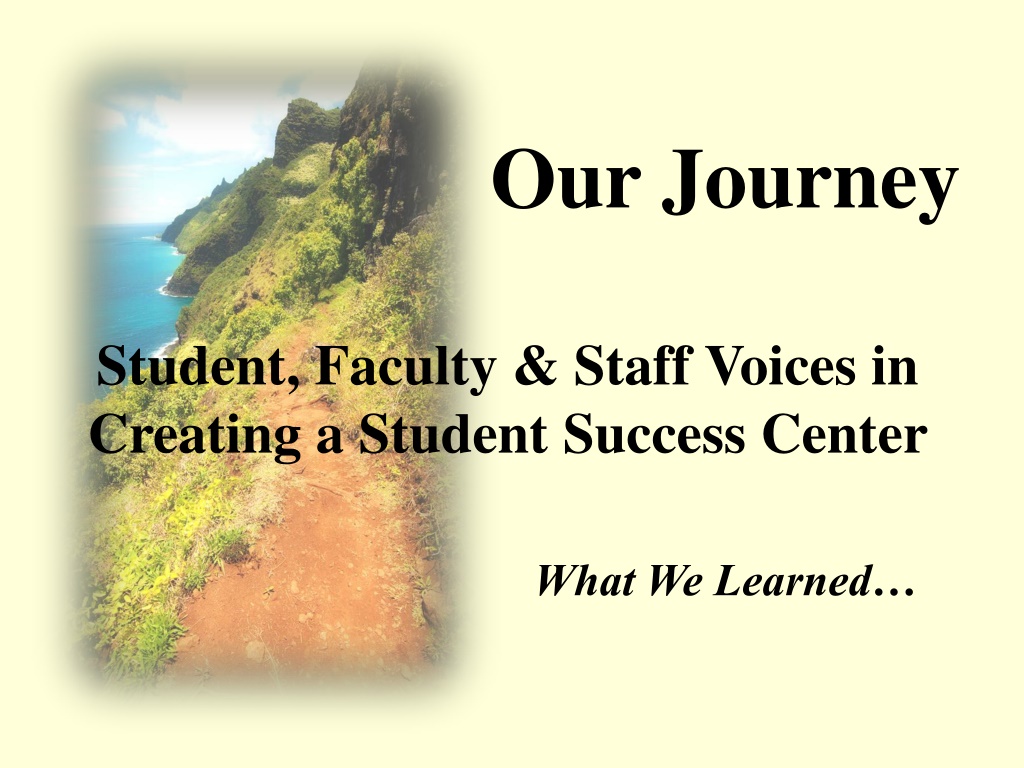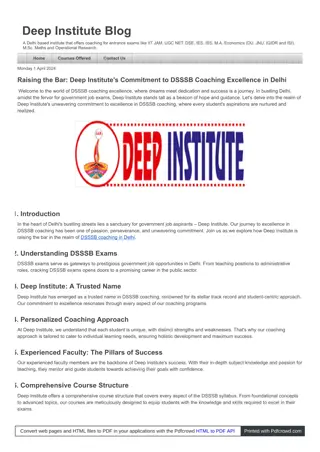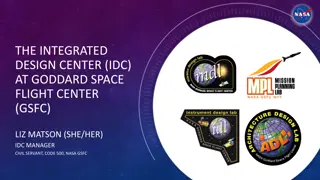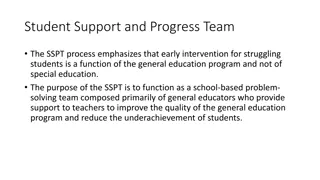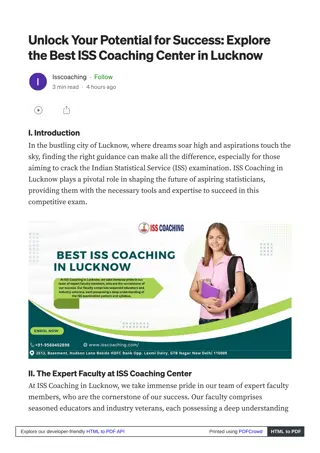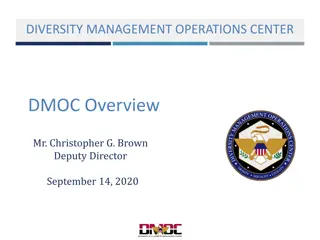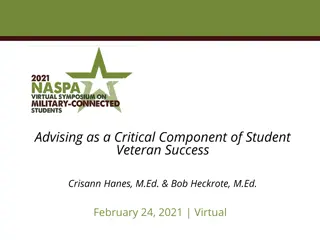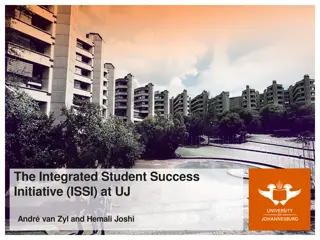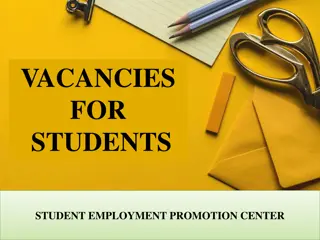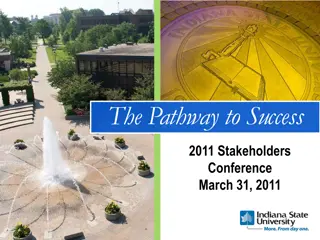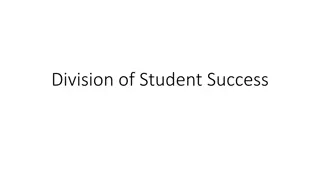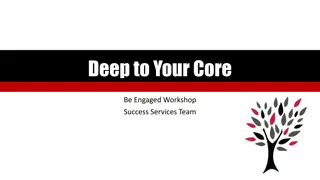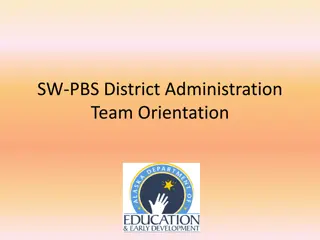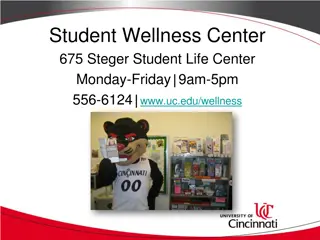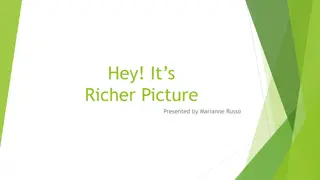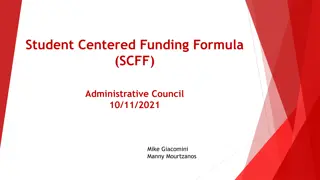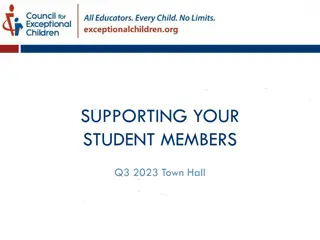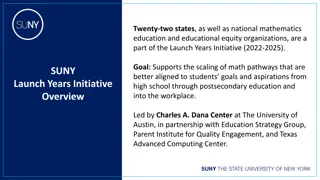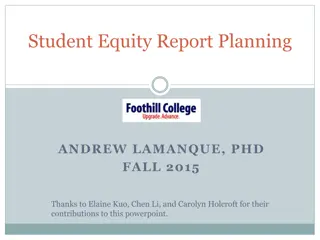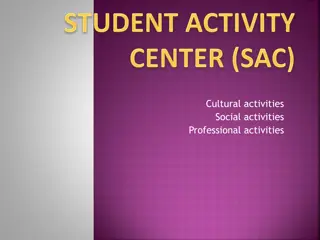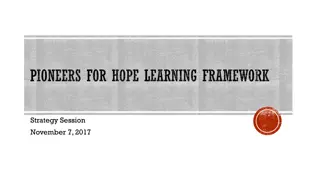Insights from Our Journey in Creating a Student Success Center
Delve into the journey of student, faculty, and staff voices in the establishment of a Student Success Center. Explore how the journey started, the insights from student surveys, activities, student ratings on personal and academic experiences, and students' desires for academic and personal success. Uncover what encourages students, from self-motivation to peer support. Gain valuable perspectives on enhancing student success in academic and personal realms.
Download Presentation

Please find below an Image/Link to download the presentation.
The content on the website is provided AS IS for your information and personal use only. It may not be sold, licensed, or shared on other websites without obtaining consent from the author. Download presentation by click this link. If you encounter any issues during the download, it is possible that the publisher has removed the file from their server.
E N D
Presentation Transcript
Our Journey Student, Faculty & Staff Voices in Creating a Student Success Center What We Learned
How Our Journey Started Foundations Taskforce Faculty Senate Campus-Wide Representation SSC Committee
Student Voices: Student Success Center Survey * Survey Share * 16 Questions * Distributed by the Office of the Vice Chancellor of Student Affairs * 3 Weeks to Respond * 523 Students, 18-65+ yrs. old * 40+ Different Majors * Prize Offered: Randomly Selected Student - $100 Gift Certificate to Ala Moana (Sponsored by the Student Engagement Office)
How Students Rated Their Personal & Academic Experience Academic Experience Highly satisfied/satisfied (437) Neutral (74) Dissatisfied (9) Very Dissatisfied (1) No Response (2) Personal Experience Highly satisfied/satisfied (404) Neutral (107) Dissatisfied (7) Very Dissatisfied (3) No Response (2)
What Students Want: Academic Success * Counselors/Tutors (280) It is hard to find someone to help with a certain need at a certain time. We need tutors qualified to help all students, across all subject areas. * Help/Resources/Support (211) Test taking strategies, financial aid and scholarship support, career development, internship opportunities, more child care and health services. * Computers/Printing Stations/Study Tools (200) Free printing, stronger and better Wi-Fi connection, textbooks in different languages, and practice exams.
What Students Want: Personal Success * Counselor & Tutor Support (210): More counselors to help get us on track and keep us on track. More guidance to a better academic, financial, and personal life. More Tutors for more subjects. * Events & Food (85): More social clubs, campus sports, job fairs, healthier and cheaper food choices, Starbucks, coffee vending machines, and/or complimentary coffee. * Technology (76): Free printing and copying, free charging stations, more computers and computer lab space, stronger and better Wi-Fi, laptop & iPad rental program.
What Encourages Students * Self-Motivation (211): My motivation is to finish school in the fastest way possible. I don t want to ever re-take a class. I have the desire to be a competitive applicant for my program of choice. * Friends/Peers (121): Friends help me to stay on track and seek the help I need. I have great experiences with peer mentors. * Extra Credit/Grades (107): Extra credit always makes me happy. I wanted good grades so I sought out my professors to help me. Extra credit gives me the lift I need to go on.
What Encourages Students * Instructors/Counselors/Peer Mentors (107): The professors willingness and openness to meet. The counselors help me reach all my goals. Motivated teachers who wants students to strive for excellence. * Family/Friends (14): My family motivates and encourages me a lot. My friends and I we push each other to do good.
What Discourages Students * Time Conflicts (152): I have 2 full-time jobs and I go to school part-time. My schedule did not match my instructors office hours. Places and offices on campus close too early. * Confusion/Shortage of Information (147): Not sure who to see and where to go. Unsure of the location of supports and services. Unclear signage. I had to run around from place to place. * Long Lines (47): Had to take a morning off from work because the wait was long.
What Discourages Students * Faculty/Staff (31): It is hard to find someone to help with a certain need at a certain time. Meeting with unfamiliar instructors is scary. Different answers from different people on the same topic. * Personal Barriers & Issues (28): Sometimes being shame to ask for help from the professors. Priorities other than school too busy with other things. * Resources/Facilities (24): There s nowhere to sit because there are many students eating lunch or hanging out. The website is not helpful when looking for answers. Too little resources for too many students.
What Motivates Students to Hang Out * Facilities (298): Modern Day Creature Comforts, gym, quiet/study area, charging/printing stations, pool table, music, gaming area, arts and crafts, etc. * Food (194): The way to a students heart (to hang out), is their STOMACH. Snack shop, coffee place, free food, candy, drinks, and more food vendors that are cheap. * Friends/Others (153): I d like to make connections and meet new people and make new friends. Single girls. Hot males would make me hang out. * Supports & Services (143): Having someone there all the time to help. Child care, please
Additional Student Insights Ideas/Comments: It s a great idea for students a place to connect with other students and to relax to escape from stress. Atmosphere: (Coffee Caf ): Make it to be a nice, caf -like, relaxing setting with coffee, sandwiches, and ice cream. Facilities: More private rooms to study and hang out with friends. Availability: Keeping the center open 24 hours would be the biggest thing for me or at least keeping it open longer after hours, especially when the library closed.
Faculty & Staff Voices: Student Success Center Survey * Survey Share * 5 Questions * Distributed by our Student Success Center Committee * 7 Weeks to Respond * 51 Responses (Faculty - 38; Staff - 7; Lecturer - 1; 5 - No Response)
What Faculty/Staff Think Students Want: Academic & Personal Success * Tutoring/Mentoring Services: Across all levels & all content areas (primarily in writing and math) on-line & face-to-face. * Counseling/Advising & Supports: Laulima 101 course, financial aid, career development, mental health, and healthy living. * Resources: High speed internet connection, computers, printers, desks, comfy chairs, more staff/personnel, and study places. * Environment: Sense of home & belonging, safe. comfortable, interactive, fun, engaging, and holistic.
Faculty/Staff Responses: What Encourages Students Counselor Support: Welcoming, caring, genuine, one- to-one, follow-through, visible, mandatory, classroom visits. Faculty: Encouraging, knowledgeable, having a personal connection, flexible office hours, extra credit/bonus points opportunities, great teacher/counselor-student rapport. Campus Supports: Centralized, accessible, welcoming, on-line assistance, tutors/Mentors, space where students can meet to work on assignments, service learning, more on-line offerings Environment: Welcoming, clear signage, safe atmosphere, a reliable, consistent place to go for help. Friends/Peers: Having friends with positive experiences, great peer mentors, seeing friends succeed.
Faculty/Staff Responses: What Discourages Students * Lack of Information: Not knowing where to go for help or knowing what supports are available, unclear information about the availability of resources and where they are located. * Faculty/Staff: Not knowledgeable of the services and supports that are available to students, unfriendly, and intimidating. * Time/Personal/Life Barriers: Busy schedule, lack of motivation, lack of inner drive, other priorities need to support family. .
Faculty/Staff Responses: What Discourages Students * Sense of Shame/Lack of Comfort: Stigma associated with getting help, shy, nervousness, and fear of judgment. * Lack of Sufficient Spaces: Too many students not enough space, very crowded, not enough areas to study. * Other: Language barriers between students and instructors, long wait to see counselors, don t want to seek services alone - easier to go with a friend.
What Faculty/Staff Believe Motivates Students to Hang Out * Personal Connection: Rapport with a specific faculty or staff member, real or perceived similarities and/or shared interests, a feeling of safety and genuine concern from faculty and staff. * Facilities: Comfortable tables and chairs, sufficient spaces to study, and good lighting. * Resources: Access to computers, printers, strong Wi-Fi, trained tutors, someone always available who are able to answer questions - counselor, peer mentor, etc.
Our Journey Continues Voices from Our Colleagues Near &Far Student Focus Groups SSC Talk Story Sessions SSC Committee Meetings SSC Open Forums Site Visits SSC Facilitation Sessions
Our Journey Continues: Where We Are Now All-Day Retreat Outline of Final Report Development of Work Plans Sharing of Work Plan Drafts Writing of Final Report
Lessons Learned This was an opportunity for a campus-wide discussion on student needs and our college s collaborative response. Campus culture is defined and prioritized by the stakeholders who define and prioritize it for themselves. This journey has been a defining career experience student- centered, professionally rewarding, and personally renewing. A campus culture that values the needs of its students cannot necessarily lead to student success if students are not engaged in the learning process.
Lessons Learned Changing campus culture is essential to decreasing discouragement in students. When you look afar, you clearly see the gifts that are right in front of you. Finding common ground in experiences, envisioning, and supporting student success - between institutions, between faculty/staff, between instructional and non-instructional groups, between faculty/staff and students is a must-have process to student success. Realizing that success comes from internal changes not from procurement of tangible possessions. Organization is of places, but culture is of spaces between places.
Most Important Lesson Learned Na Ke Kauhale Ke Kuleana It is the responsibility of the village.
THANK YOU! Any Questions? Contact: Veronica Ogata (vogata@hawaii.edu)
